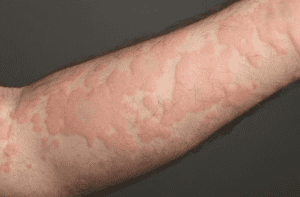
Food protein induced enterocolitis syndrome (FPIES) typically affects infants and young children, and causes symptoms of vomiting and bloody diarrhea that leads to dehydration and shock after the consumption of certain foods.
FPIES may be confused with food allergies, since the reaction occurs after the consumption of certain foods. However FPIES is not an IgE mediated food allergy, as such allergy blood tests that measure specific IgE towards the food is not helpful.

Symptoms of FPIES are often delayed, usually within a few hours of eating the culprit food. The patient usually presents with vomiting and diarrhea that rapidly progress to dehydration and shock in 15-20% of patients. The child usually presents to the emergency appearing lethargic and is usually diagnosed as septic. Bloody stools can be the initial manifestation of FPIES although this is more commonly seen in Food protein induced protocolitis syndrome. The two most common culprit foods are cow milk and soy.
Although FPIES is a clinical diagnosis, the nonspecific symptoms and lack of definitive diagnostic tests may also contribute to a delay in diagnosis. Management of FPIES consists of removing the offending food from the diet. For infants, exclusively breastfeeding can be protective. Extensively hydrolyzed casein formulas are recommended for infants that cannot be breast-fed. Oral food challenge can be done to determine when the child has outgrown FPIES to the trigger food; this should be done with physician supervision and preferably in a hospital setting.




